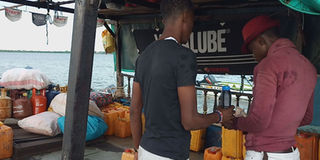Floating stations run dry as fuel shortage hits Lamu

One of the floating fuel stations in Lamu Old Town. All the five stations in the archipelago are not operating due to the fuel shortage crisis. PHOTOS | KALUME KAZUNGU | NATION MEDIA GROUP
What you need to know:
“We have more than 50 boats which are lying idle since they have no fuel to operate,” Lamu Boat Operators Association chairman Hassan Awadh said.
Mr Reuben Kahindi, a coxswain, said he suspects some petrol stations are hoarding the commodity.
Ms Farida Athman called on the government to find a permanent solution to the problem, saying ordinary people are suffering.
All the five floating petrol stations in Lamu Old Town are not operating due to the fuel shortage that has hit the archipelago.
A spot check by the Nation on Friday morning revealed that most of the boat operators and passengers on Lamu Island and Shella town were stranded following the fuel crisis as a result of the 16 percent value added tax (VAT) imposed on petroleum products.
BOATS
Many boats remained parked in their yards with just a handful still in operation.
Speaking to the Nation on Friday, Lamu Boat Operators Association chairman Hassan Awadh said despite the Thursday move by the Bungoma High Court to stop the 16 percent VAT on petroleum products, no changes have been seen in Lamu, with most petrol stations on the island having no fuel.
Some coxswains had to cross over from Lamu Island to Mokowe, Hindi and Mpeketoni in the mainland in search of the commodity from the few distributors who had it.
According to Mr Awadh, the boat operators have been buying a litre of petrol at between Sh135 and Sh150.
“We have more than 50 boats which are lying idle since they have no fuel to operate. Only those who had stored fuel prior to the current situation are still operating. By the end of today, many people here will be rendered jobless unless something is done to fix the problem,” said Mr Awadh.
COXSWAIN
Mr Reuben Kahindi, a coxswain, said he suspects some petrol stations are hoarding the commodity.
“Some of these petrol station owners have passenger boats plying the Lamu Indian Ocean waters. They don’t want to sell petrol to other operators with the intention of monopolising the boat transport business. They only fuel their boats so that they can take advantage of the huge number of passengers at the moment to make as many trips as possible and get lots of money by the time the problem is fixed,” Mr Kahindi said.
However, a customer service attendant at one of the floating fuel stations told the Nation they had run out of stock and were waiting for fuel from their distributors in Mombasa.
“We don’t have fuel today. We will have to restock though we don’t know when that will happen. I am not sure when restocking will be done considering the 16 percent tax increase,” said the attendant who sought anonymity.
A section of passengers who spoke to the Nation expressed concern over the crisis.
Ms Farida Athman called on the government to find a permanent solution to the problem, saying ordinary people are suffering.
“We only have few boats operating with the rest parked due to lack of fuel. Does it mean that if the issue is not solved we will remain here in Lamu town without moving to other places for lack of transport? We call on President Uhuru Kenyatta to personally intervene and solve the issue. Kenyans are suffering,” Ms Athman said.
Lamu residents depend on sea transport and following the fuel shortage, movement in the old town and other adjacent islands has been adversely affected.





